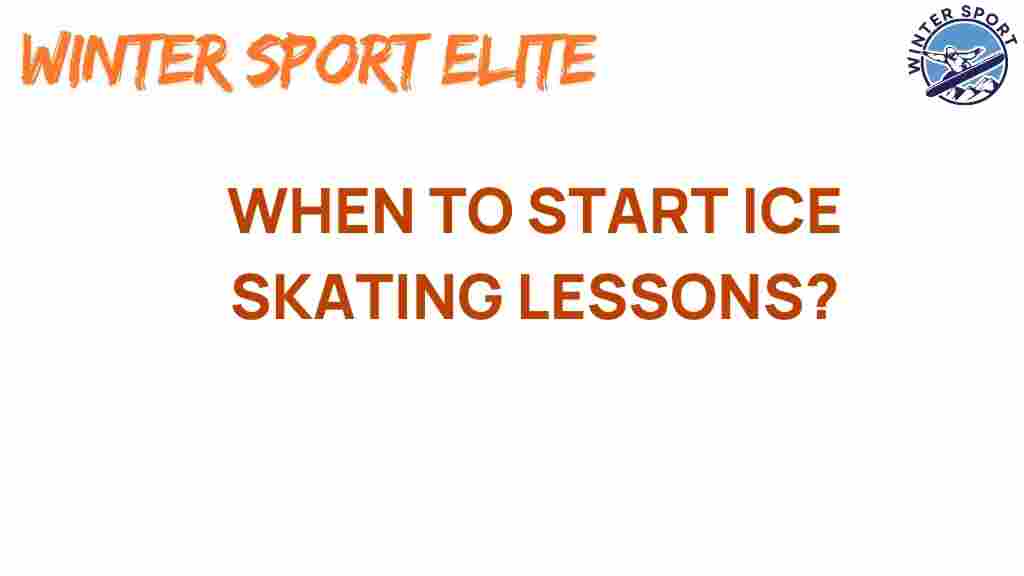The Perfect Time to Start Ice Skating Lessons: A Comprehensive Guide
Ice skating is an exhilarating activity that combines physical fitness with artistic expression. Whether you’re a complete beginner or someone looking to refine your skills, starting ice skating lessons can be a transformative experience. This comprehensive guide will cover everything you need to know about the perfect time to begin ice skating lessons, focusing on age, techniques, safety, enjoyment, skills, and coaching.
Why Start Ice Skating Lessons?
Ice skating offers numerous benefits, including:
- Physical fitness: It enhances cardiovascular health and builds strength.
- Coordination: Skating improves balance and coordination skills.
- Social interaction: Joining a class provides an opportunity to meet new people.
- Fun and enjoyment: It’s a thrilling way to spend time outdoors or indoors.
Determining the Right Age to Start Ice Skating Lessons
One of the most frequently asked questions by parents and individuals is: “What is the best age to start ice skating lessons?” While there is no definitive answer, here are some guidelines:
- Children: Many ice skating rinks offer lessons for children as young as 3 years old. At this age, lessons focus on basic skills and fun.
- Teens: Older children and teenagers can start formal lessons to advance their skills quickly.
- Adults: It’s never too late to start! Adult lessons are designed to cater to various skill levels, making it a viable option for anyone.
When to Start Ice Skating Lessons
The best time to start ice skating lessons depends on several factors:
- Season: Winter is typically the prime season for ice skating, but many indoor rinks offer year-round lessons.
- Personal schedule: Consider starting lessons when your schedule allows for consistent practice.
- Local availability: Check if local rinks offer beginner programs that fit your timeline.
Choosing the Right Ice Skating Techniques
As a beginner, mastering the foundational techniques is crucial. Here are some essential skills you will learn:
- Stance and balance: Learning how to properly position your body on skates.
- Stopping techniques: Mastering the snowplow and T-stop methods to halt safely.
- Gliding: Understanding how to glide smoothly across the ice.
- Turning: Learning how to make both wide and tight turns.
- Forward and backward skating: Developing the ability to skate in both directions.
Safety Precautions for Ice Skating Lessons
Safety is paramount when it comes to ice skating. Here are some essential tips:
- Wear proper gear: Always wear a helmet, knee pads, and wrist guards, especially for beginners.
- Check the ice: Ensure the rink is well-maintained and the ice is safe for skating.
- Stay within your limits: Avoid attempting advanced techniques until you’re ready.
Finding the Right Ice Skating Coach
A good coach can significantly impact your learning experience. Here are some tips for finding the right one:
- Credentials: Look for coaches with appropriate certifications and experience.
- Teaching style: Choose a coach whose teaching methods resonate with you.
- Reviews: Check reviews or ask for recommendations from other skaters.
Enjoyment: Keeping It Fun!
While learning ice skating techniques is essential, the key to long-term commitment is enjoyment. Here are ways to keep your skating experience fun:
- Set realistic goals: This will help you stay motivated without feeling overwhelmed.
- Join group lessons: Skating with others can make the experience more enjoyable.
- Participate in events: Look for skating events or social nights at your local rink.
Step-by-Step Process for Beginners
Here’s a step-by-step process for starting your ice skating lessons:
- Research: Look for local rinks offering beginner lessons.
- Sign up: Register for a class that fits your schedule.
- Prepare: Gather the necessary gear, including skates, helmet, and pads.
- Attend lessons: Arrive early to familiarize yourself with the rink.
- Practice: Dedicate time between lessons to practice the skills learned.
- Evaluate progress: Regularly assess your skills and seek feedback from your coach.
Troubleshooting Common Issues
As a beginner, you may encounter some challenges. Here are common issues and how to address them:
- Fear of falling: Remember that falling is a part of learning. Practice safe falling techniques.
- Difficulty balancing: Focus on your stance and consider practicing off-ice balance exercises.
- Frustration with progress: Everyone learns at their own pace; don’t hesitate to ask your coach for help.
Conclusion
Starting ice skating lessons can be an exciting journey filled with challenges and triumphs. By understanding the perfect time to begin, the essential techniques to learn, and the importance of safety and enjoyment, you can make the most of your ice skating experience. Remember, whether you are a child, teen, or adult, ice skating offers a unique blend of fun and fitness that can be enjoyed at any age.
For more information on ice skating techniques and lessons, you can visit this resource. If you are interested in finding local ice skating opportunities, check your nearest rink or look for classes available in your area.
Embrace the joy of ice skating and take your first step onto the ice today!
This article is in the category Training and created by WinterSportElite Team
